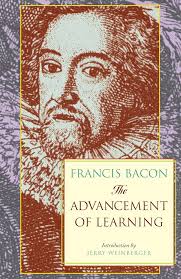The Advancement of Learning Page #32
The Advancement of Learning, published by Francis Bacon in 1605, is a foundational text in the history of science and philosophy. In this work, Bacon advocates for empirical research and the systematic organization of knowledge, laying the groundwork for the scientific method. The book critiques existing scholarly practices and proposes a new approach to learning based on observation and experimentation. It marks a significant shift towards modern scientific inquiry.
- Year:
- 1605
- 1,153 Views
Submitted by acronimous on August 11, 2024
Modified by acronimous on August 11, 2024
suppose numbers to be the principles and originals of things. And it is true also that of all other forms (as we understand forms) it is the most abstracted and separable from matter, and therefore most proper to metaphysic; which hath likewise been the cause why it hath been better laboured and inquired than any of the other forms, which are more immersed in matter. For it being the nature of the mind of man (to the extreme prejudice of knowledge) to delight in the spacious liberty of generalities, as in a champaign region, and not in the inclosures of particularity, the mathematics of all other knowledge were the goodliest fields to satisfy that appetite. But for the placing of this science, it is not much material: only we have endeavoured in these our partitions to observe a kind of perspective, that one part may cast light upon another. (2) The mathematics are either pure or mixed. To the pure mathematics are those sciences belonging which handle quantity determinate, merely severed from any axioms of natural philosophy; and these are two, geometry and arithmetic, the one handling quantity continued, and the other dissevered. Mixed hath for subject some axioms or parts of natural philosophy, and considereth quantity determined, as it is auxiliary and incident unto them. For many parts of Nature can neither be invented with sufficient subtlety, nor demonstrated with sufficient perspicuity, nor accommodated unto use with sufficient dexterity, without the aid and intervening of the mathematics, of which sort are perspective, music, astronomy, cosmography, architecture, engineery, and divers others. In the mathematics I can report no deficience, except it be that men do not sufficiently understand this excellent use of the pure mathematics, in that they do remedy and cure many defects in the wit and faculties intellectual. For if the wit be too dull, they sharpen it; if too wandering, they fix it; if too inherent in the sense, they abstract it. So that as tennis is a game of no use in itself, but of great use in respect it maketh a quick eye and a body ready to put itself into all postures, so in the mathematics that use which is collateral and intervenient is no less worthy than that which is principal and intended. And as for the mixed mathematics, I may only make this prediction, that there cannot fail to be more kinds of them as Nature grows further disclosed. Thus much of natural science, or the part of Nature speculative. (3) For natural prudence, or the part operative of natural philosophy, we will divide it into three parts—experimental, philosophical, and magical; which three parts active have a correspondence and analogy with the three parts speculative, natural history, physic, and metaphysic. For many operations have been invented, sometimes by a casual incidence and occurrence, sometimes by a purposed experiment; and of those which have been found by an intentional experiment, some have been found out by varying or extending the same experiment, some by transferring and compounding divers experiments the one into the other, which kind of invention an empiric may manage. Again, by the knowledge of physical causes there cannot fail to follow many indications and designations of new particulars, if men in their speculation will keep one eye upon use and practice. But these are but coastings along the shore, premendo littus iniquum; for it seemeth to me there can hardly be discovered any radical or fundamental alterations and innovations in Nature, either by the fortune and essays of experiments, or by the light and direction of physical causes. If, therefore, we have reported metaphysic deficient, it must follow that we do the like of natural magic, which hath relation thereunto. For as for the natural magic whereof now there is mention in books, containing certain credulous and superstitious conceits and observations of sympathies and antipathies, and hidden proprieties, and some frivolous experiments, strange rather by disguisement than in themselves, it is as far differing in truth of Nature from such a knowledge as we require as the story of King Arthur of Britain, or Hugh of Bourdeaux, differs from Cæsar’s Commentaries in truth of story; for it is manifest that Cæsar did greater things de vero than those imaginary heroes were feigned to do. But he did them not in that fabulous manner. Of this kind of learning the fable of Ixion was a figure, who designed to enjoy Juno, the goddess of power, and instead of her had copulation with a cloud, of which mixture were begotten centaurs and chimeras. So whosoever shall entertain high and vaporous imaginations, instead of a laborious and sober inquiry of truth, shall beget hopes and beliefs of strange and impossible shapes. And, therefore, we may note in these sciences which hold so much of imagination and belief, as this degenerate natural magic, alchemy, astrology, and the like, that in their propositions the description of the means is ever more monstrous than the pretence or end. For it is a thing more probable that he that knoweth well the natures of weight, of colour, of pliant and fragile in respect of the hammer, of volatile and fixed in respect of the fire, and the rest, may superinduce upon some metal the nature and form of gold by such mechanic as longeth to the production of the natures afore rehearsed, than that some grains of the medicine projected should in a few moments of time turn a sea of quicksilver or other material into gold. So it is more probable that he that knoweth the nature of arefaction, the nature of assimilation of nourishment to the thing nourished, the manner of increase and clearing of spirits, the manner of the depredations which spirits make upon the humours and solid parts, shall by ambages of diets, bathings, anointings, medicines, motions, and the like, prolong life, or restore some degree of youth or vivacity, than that it can be done with the use of a few drops or scruples of a liquor or receipt. To conclude, therefore, the true natural magic, which is that great liberty and latitude of operation which dependeth upon the knowledge of forms, I may report deficient, as the relative thereof is. To which part, if we be serious and incline not to vanities and plausible discourse, besides the deriving and deducing the operations themselves from metaphysic, there are pertinent two points of much purpose, the one by way of preparation, the other by way of caution. The first is, that there be made a calendar, resembling an inventory of the estate of man, containing all the inventions (being the works or fruits of Nature or art) which are now extant, and whereof man is already possessed; out of which doth naturally result a note what things are yet held impossible, or not invented, which calendar will be the more artificial and serviceable if to every reputed
Translation
Translate and read this book in other languages:
Select another language:
- - Select -
- 简体中文 (Chinese - Simplified)
- 繁體中文 (Chinese - Traditional)
- Español (Spanish)
- Esperanto (Esperanto)
- 日本語 (Japanese)
- Português (Portuguese)
- Deutsch (German)
- العربية (Arabic)
- Français (French)
- Русский (Russian)
- ಕನ್ನಡ (Kannada)
- 한국어 (Korean)
- עברית (Hebrew)
- Gaeilge (Irish)
- Українська (Ukrainian)
- اردو (Urdu)
- Magyar (Hungarian)
- मानक हिन्दी (Hindi)
- Indonesia (Indonesian)
- Italiano (Italian)
- தமிழ் (Tamil)
- Türkçe (Turkish)
- తెలుగు (Telugu)
- ภาษาไทย (Thai)
- Tiếng Việt (Vietnamese)
- Čeština (Czech)
- Polski (Polish)
- Bahasa Indonesia (Indonesian)
- Românește (Romanian)
- Nederlands (Dutch)
- Ελληνικά (Greek)
- Latinum (Latin)
- Svenska (Swedish)
- Dansk (Danish)
- Suomi (Finnish)
- فارسی (Persian)
- ייִדיש (Yiddish)
- հայերեն (Armenian)
- Norsk (Norwegian)
- English (English)
Citation
Use the citation below to add this book to your bibliography:
Style:MLAChicagoAPA
"The Advancement of Learning Books." Literature.com. STANDS4 LLC, 2025. Web. 6 Mar. 2025. <https://www.literature.com/book/the_advancement_of_learning_3165>.








Discuss this The Advancement of Learning book with the community:
Report Comment
We're doing our best to make sure our content is useful, accurate and safe.
If by any chance you spot an inappropriate comment while navigating through our website please use this form to let us know, and we'll take care of it shortly.
Attachment
You need to be logged in to favorite.
Log In